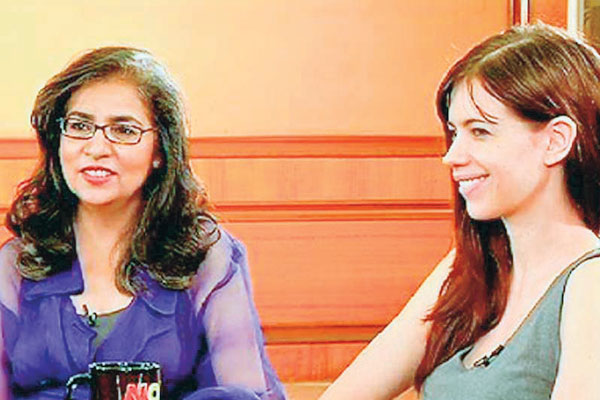A documentary, centering upon the way people in Pakistan and India perceive each other, has been in the works for quite some time now. Titled Azmaish – Trials of Life, the project is spearheaded by award-winning Pakistani filmmaker Sabiha Sumar (of Khamosh Pani fame) and Indian actress Kalki Koechlin.
BORDERCROSSING
Collaborating with Pakistani filmmaker Sabiha Sumar on a documentary called Azmaish, Indian actress Kalki Koechlin reflects on what she learned from the process.
A documentary, centering upon the way people in Pakistan and India perceive each other, has been in the works for quite some time now. Titled Azmaish – Trials of Life, the project is spearheaded by award-winning Pakistani filmmaker Sabiha Sumar (of Khamosh Pani fame) and Indian actress Kalki Koechlin.
Traveling across India and Pakistan, Sumar and Koechlin spoke to people to find out how they feel about acts of terror committed in the name of religion. The shooting for the film has finished and it will soon make its way across the festival circuit once the financial requirement is met.

Sabiha Sumar and Kalki Koechlin
In a recent interview with The Indian Express, Koechlin spoke about her experience of working on the documentary including working with Sumar.
Beginning with how Azmaish offers a different perspective on the relationship between Pakistan and India, Koechlin elaborated, “Usually, we see the two countries through the prism of conflict. Or cricket, which is also conflict. With Azmaish, we try to understand India-Pakistan from a different perspective. It arises from the need to know this person across the border, without the media or the politics playing a role. It’s about what the common man on the street has to say.”
The documentary features the two women travelling across various regions within the two countries and talking to people about their experiences.
“I went to remote areas in Sindh with Sabiha — just very poor areas where women walk for hours just to get water, Koechlin reflected. “We took a similar journey to Haryana, where it wasn’t so much about poverty but more about the status of women, and gender inequality that shook us. We spoke to feudal landlords, truck drivers in Karachi and businessmen in both countries.”
During the project, Koechlin learnt a lot of things about the two countries and observed how the two societies are different from each other despite sharing certain similarities. “I realized that despite the obvious similarities in culture and language, India and Pakistan are vastly different nations,” Koechlin stated. “The constant blame game and comparison is unfair. Both have glaring issues and need to look inward, rather than point fingers at each other. The project made us wonder if we are looking for a religious identity in India now and what that did to Pakistan. I am happy to report that most Indians are still fairly secular. More than ever now, the two countries need to continue cultural exchange and constant debate.”
While in Pakistan, Koechlin met some girls who shared their aspirations of becoming actors and how they were unable to do so because of societal restrictions.
She also met with feudal landlords in Pakistan and their Indian counterparts although the experience of talking to both remains vastly different.
“We met some feudal landlords in Pakistan, and one of them was very open to conversation despite the fact that we criticised his lot,” she said. “In fact, getting Indian businessmen to talk was tougher, as soon as one mentioned Pakistan. Sabiha was very brave, and travelled to areas in Pakistan where she was the only woman, and debated with religious heads on Islam.”
Speaking about her experience of working with Sumar, Koechlin noted, “I watched her as a guide, since this is my first (docu),” the actress maintained. “She is a very sensitive person, and that’s where we connect the most. She was trying to understand her identity — a Pakistani married to a Sri Lankan, with a decade spent in Delhi. And I am French-Indian, so we get along. We also differ, of course. She fears that India is moving towards extremism, and I try and tell her that we are too diverse for one person to rule the discourse.”
Towards the end of the interview, Koechlin noted that currently the two women are busy with editing Azmaish after which the film will head to London.
– With information from The Indian Express